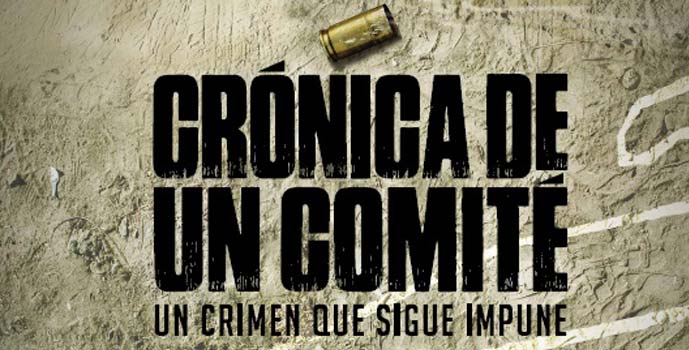Título Original: Crónica de un comité
Título Español: Crónica de un comité
País: Chile
Año: 2014
Ficha técnica:
-Dirección: José Luis Sepúlveda y Carolina Adriazola
-Producción: Carolina Adriazola
-Director de fotografía: José Luis Sepúlveda y Carolina Adriazola
-Montaje: José Luis Sepúlveda y Carolina Adriazola
-Duración: 100 mins.
Reseña extraída de www.fidocs.cl
“José Luis Sepúlveda y Carolina Adriazola tienen una impronta autoral de la que ningún otro realizador chileno puede hacer gala: sus películas sudan rabia y abatimiento. Es un cine tan subversivo en su forma y fondo que no sólo burlan los cánones de belleza y narración, sino que no pueden ser aquilatados desde esos parámetros.
En este caótico seguimiento a un comité solidario-político por la muerte de Manuel Gutiérrez (un chico de 16 años que murió por el disparo de un carabinero, al lado de Gerson, su hermano minúsvalido, durante una noche de protesta) se refleja el extravío de un grupo que no sabe ni lo que es ni lo que busca más que un grado casi intangible: quieren justicia. Y así como la familia se deja seducir por la visita de un par de capellanes evangélicos de Carabineros, el comité convierte a Manuel en mártir simbólico de las luchas de estudiantes y mapuches, Gerson empieza a tomarle el gusto a la “fama”. Un revoltijo de elementos perturbadores exhibidos sin juicios ni condescendencia. J.M.”
José Luis Sepúlveda and Carolina Adriazola share an author’s imprint no other Chilean filmmaker can boast of: their films exude anger and dejection. The truth is, it is such a subversive cinema in form and content that it not only avoids the standards for beauty and narrative; it cannot be assessed with those parameters.
This chaotic following of a humanitarian-political committee that came together after the death of Manuel Gutiérrez – a 16-year-old youth that died from a stray police bullet, next to Gerson, his handicapped brother, during a night of protests – reflects the lack of direction in a group that does not know what it is or what it is searching for, beyond and intangible need for justice. Just like the family allows themselves to be seduced by the visit of a couple of Evangelical police chaplains, the committee turns Manuel into a symbolic martyr for the struggles of the students and the Mapuche, and Gerson starts to appreciate his “fame.” Here is a tangle of disturbing elements shown without judgment or condescension. J.M.”
